Use This Information to Eliminate Family Stress

Do you worry that your child is disorganized? Have you noticed that your children are different from each other and from you that way? Does that tend to cause family stress?
We all have unique personality profiles based on our learning preferences, strengths and talents. Our strengths help us deal with the demands of our world, but they can also get us into trouble (especially when our style conflicts with our partners, parents, friends, or children).
Consider Jane, age 11, a creative dreamer who rarely completes things in a timely manner and her mother, Barbara, a highly organized professional who prides herself on running her home and family with precision. Jane's job is to clear the dinner table and load the dishwasher—a task Barbara estimates should take 10 minutes. For Jane, it usually takes thirty minutes. She has turned this boring, predictable task into a creative opportunity, carrying on a lively discussion during her task as if she were teaching young children to categorize. Barbara places a high value on how the task is accomplished and fails to enjoy Jane's creative talents.
Jane and Barbara have two distinct ways of interacting with the world—two different personal styles. Is one better than the other? It depends on the situation. In the best of all worlds, Jane would have 30 minutes to do her chores her own way. However, there are times when she needs to adapt to the demands of her environment. The secret is balance.
The Personality Prototype Model (Baum & Nicols 2004) can be highly useful in helping families appreciate the unique contributions each member brings to family, school, and personal relationships. We possess all of the 4 styles in different amounts, giving us each a unique profile, depending on whether we are balanced across all four or have preferences in one or two.
When parents accept that their children have different personality profiles, they are better able to set the whole family up for success. Lives work better if we can spend the majority of time in environments that align to our strengths. But there are times when the demands of any task or situation requires the ability to use the skills from our less-preferred styles.
Article continues below...
What's Your Parenting Style?
Take a quiz to find out what kind of a parent you are.
Personality Prototype Model
The four categories are:
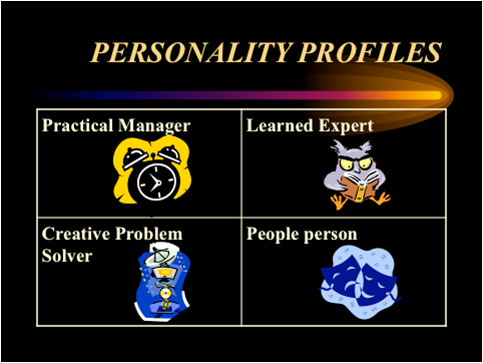
1. Practical Managers
Concrete, sequential thinkers who a have a gift for organizing people and things. Happiest with one or two friends who share their interests and talents.
Difficulties may occur when things are out of place, routine changes, there is too much chaos, or no one seems in charge!
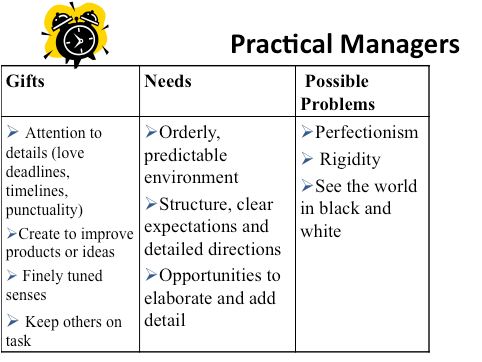
2. Learned Experts
Excellent debaters with a penchant for scholarly pursuits, reading, watching documentaries, and listening to interesting and informed people.
Happiest when engaged in some sort of intellectual pursuit, interacting with others whose abilities they admire, or when allowed to give their opinion and make their points of view known.
Difficulties arise when not sufficiently challenged, when asked to end a research aspect of a task, or when frustrated by limited access to other people of a similar style.
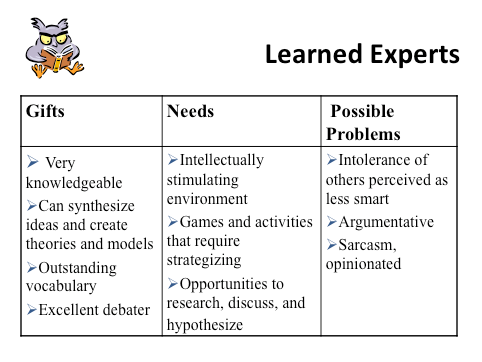
3. People Persons
Social beings with a talent for human relations and creating harmony.
Happiest when allowed to meaningfully connect with others, work in group activities and help others get along.
Stress arises when there is conflict, when personal relationships take priority over academic tasks, when they get lost in the emotions of the moment, or when a learning environment is overly critical or the students do not feel they belong.
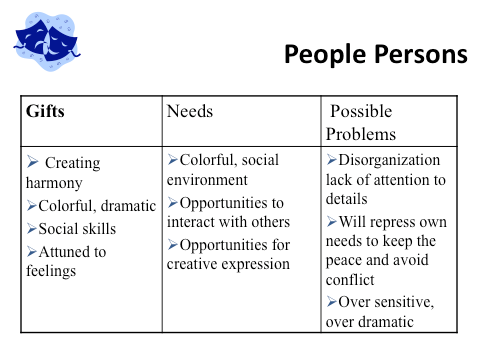
4. Creative Problem Solvers
Creative problem solvers with a talent for innovation, understanding that rules can be bent and exceptions made for the good of the cause.
Happiest when they are given choices and work on multiple projects at once, they prefer open-ended assignments, opportunities to be creative, and permission to pursue tasks their own way with few but general guidelines.
Difficulties arise with disorganization, when they do not listen to directions and find themselves confused about what is expected of them, and when they have to focus on sequential details that are required in many learning environments. They also have difficulty making commitments in and out of school.
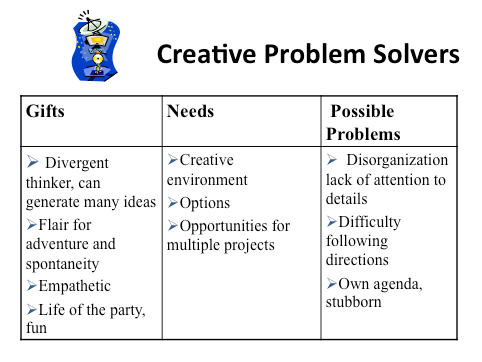
What Profiles are your Family?
When we take time to understand our children in terms of their personality, we can relate better to each other and cope more easily with the demands of the environment. If Jane's mother better understood Jane as a Creative Problem Solver, her mother could then better appreciate and nurture Jane's rich imagination. Supporting Jane's need for choice, her mother could help Jane develop her own schedule for task completion. You can use the Free Baum & Nicols Personality Prototype Profiler with students in fifth grade and up. There is also a scale for adults. Use it with the whole family to help everyone understand your family dynamics, reduce family stress, and improve organization!
This article is adapted from The 2-E profile: Multiple Perspectives by Susan Baum, Cynthia Novak, Lesli Preuss, and Marcy Dann which appeared in The 2e Newsletter, Oct/Nov, 2009. Issue 36.

